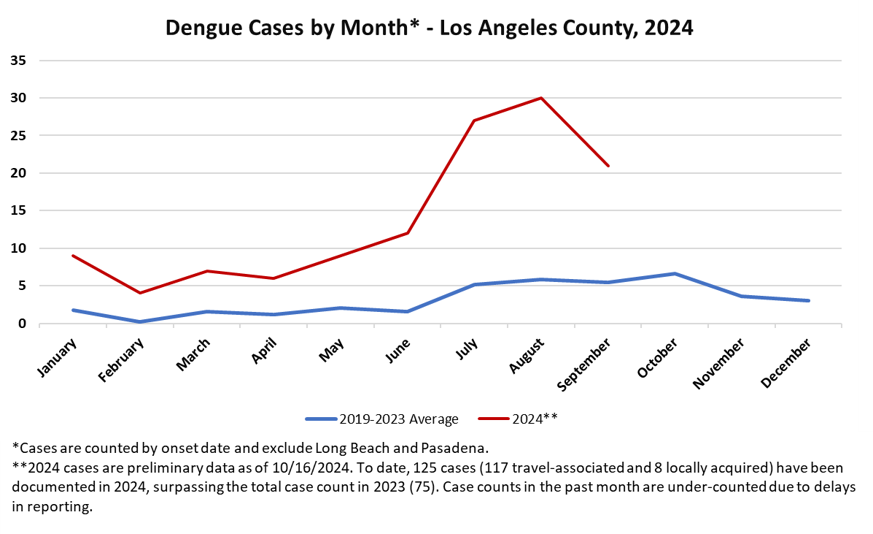
- Public Health has identified seven locally acquired dengue infections in LA County in the La Puente area, Sun Valley, and North Hollywood. Symptomatic cases were sick around mid-September to mid-October and all have recovered.
- The risk for widespread dengue virus transmission in Los Angeles County remains low. However, this case highlights that infected mosquitoes can occur locally and underscores the importance of preventive measures to reduce the risk of mosquito-borne diseases.
Residents can call 2-1-1 for help locating a health care provider. Health care providers can call the Acute Communicable Disease Control Program for more dengue information:
For help with reducing mosquitoes in and around your home, find your Vector Control District by zip code here.
Health care providers are mandated to report dengue and other mosquito-borne infections.
Report any suspected locally acquired dengue to Public Health immediately by phone.
Los Angeles County DPH Acute Communicable Disease Control:
- Weekdays 8:30am–5pm: call 888-397-3993.
- After-hours: call 213-974-1234 and ask for the physician on call.
Long Beach Health and Human Services:
- Weekdays 8am-5pm: call 562-570-4302.
- After hours: call the duty officer at 562-500-5537.
Pasadena Public Health Department:
- Weekdays 8am-5pm: call 626-744-6089.
- After hours: call 626-744-6043.
Travel-associated dengue infections must be reported to Public Health within 1 working day from identification.
Los Angeles County DPH Acute Communicable Disease Control:
- Mail or fax - complete a Confidential Morbidity Report (CMR) form and follow fax, secure email, and mail instructions, or
- Phone – call 888-397-3993 weekdays 8:30am-5:00 pm.
Long Beach Health and Human Services:
- Fax a Long Beach CMR to 562-570-4374 or send by secure email to LBEpi@longbeach.gov, or
- Call 562-570-4302 weekdays 8:00 am-5:00 pm.
Pasadena Public Health Department:
- Complete a Pasadena CMR and send by fax to 626-744-6115, or
- Call 626-744-6089 weekdays 8:00 am-5:00 pm.
Visit Provider Communicable Disease Reporting in LA County to learn more about mandated reporting.

What is Dengue?
Dengue is a disease caused by a virus that spreads to people mainly through mosquito bites. Dengue is common in tropical and subtropical regions such as the Caribbean (including Puerto Rico), Central and South America, Southeast Asia, and the Pacific islands. See CDC Areas with Risk of Dengue. Because the types of mosquitoes that spread dengue are common throughout many areas of the United States, local spread of dengue is possible. In the continental U.S., cases of locally spread dengue have been rare, with a few reported in Florida, Hawaii, Texas, and more recently, Arizona and California.
Symptoms of Dengue
About one in four people with dengue will get symptoms.
THE MOST COMMON SYMPTOMS ARE FEVER

Fever
AND ONE OR MORE OF THE FOLLOWING:

Eye Pain

Headache

Muscle, Bone, or Joint Pain

Nausea or Vomiting

Rash
The best way to prevent getting dengue is to avoid mosquito bites
Prevention
It is important to note that this infection is preventable! By taking action to decrease mosquito breeding by checking our own homes and yards weekly for items that hold standing water where mosquitoes can breed- and to clean, cover or clear out such items-, keeping pools well maintained, stocking ponds with mosquito fish which eat mosquito eggs. Since mosquitoes can breed in anyone’s backyard, it takes only a few infected mosquitoes to place the whole community at risk.
Residents can also protect themselves from mosquito bites by using mosquito repellant in the form of spray, wipes or lotion, wearing long-sleeved shirts and pants, and by making sure our windows and door screens are in good condition to prevent mosquito entry.
When used as directed, Environmental Protection Agency (EPA)-registered insect repellents are proven safe and effective, even for pregnant and breastfeeding women. Use an EPA-registered insect repellent with one of the following active ingredients:
If residents are traveling to areas of the world that have dengue or other mosquito-borne diseases
Individuals infected with dengue can stop the spread of the virus by protecting themself from any more mosquito bites for at least 7 days after the start of fever (this can be done by staying indoors and/or using mosquito repellents with DEET). During this time, dengue virus can be found in the blood and passed from an infected person to another mosquito through mosquito bites. An infected mosquito can then spread the virus by biting other people.
Dengue Vaccine
Dengvaxia was approved by the Food and Drug Administration in 2021 and is recommended for children and adolescents aged 9 – 16 years who have had a laboratory confirmed previous dengue virus infection AND live in areas where dengue is common. Three doses are required for protection against dengue infection.
However, production of this product was discontinued due to low demand and currently, this vaccine cannot be ordered from manufacturers. The last doses of this product will expire in August 2026. The vaccine is not recommended for children who have not had dengue due to an increased risk of hospitalization and illness if infected after vaccination.
There are currently no other vaccines under review by the FDA, although other dengue vaccines that are approved for use in other countries.
See Health Education for FAQs and other resources in English and Español.
For Help Controlling Mosquitos, Contact Your Local Vector Control District
News and Updates
- LAC DPH Health Advisory: Locally Acquired Case of Dengue in Los Angeles County PDF | Web/Mobile (10-15-25)
- News Release: Public Health Investigating First Case of Locally Acquired Dengue for the 2025 Mosquito Season (10-15-25)
- CDC Health Update: Ongoing Risk of Dengue Virus Infections and Updated Testing Recommendations in the United States CDC Health Update PDF | Web/Mobile (3-18-25)
- LAC DPH Press Release: More Cases of Locally Acquired Dengue Virus Identified in Baldwin Park (10-15-24)
- LAC DPH Press Release: Public Health Investigating Fifth Case of Locally Acquired Dengue (10-2-24)
- LAC DPH Press Release: Public Health Investigating One Additional Case of Locally Acquired Dengue (9-25-24)
- LAC DPH Press Release: Public Health Investigating Unprecedented Cluster of Locally Acquired Dengue Cases - Residents urged to take steps to prevent ongoing transmission (9-18-24)
- LAC DPH Press Release: Public Health Confirms Case of Locally Acquired Dengue (9-9-24)
- Long Beach Department of Health and Human Services: Long Beach Health Department Confirms Case of Locally Acquired Dengue (11-1-23)
- CDC MMWR: First Locally Acquired Dengue Virus Infections — Pasadena, California, October–December 2023
- CDC MMWR: First Evidence of Locally Acquired Dengue Virus Infection — Maricopa County, Arizona, November 2022
Recent Health Alerts
- LAC DPH Health Alert: Locally Acquired Case of Dengue in Los Angeles County (9-9-24)
- CDC Health Advisory: Increased Risk of Dengue Virus Infection in the United States (6-26-24)
- LAC DPH Health Alert: First Locally Acquired Case of Dengue in California Detected in Pasadena (10-23-23)
- CDPH Health Advisory: Dengue Infection in California (10-30-23)
LAC DPH
- Webinar: What Clinicians Need to Know About Dengue in Los Angeles County (7-11-24)
- ACDC: Letter to Physicians: Vector-borne Disease Risk for Los Angeles County Residents, August 2023
CDC
- Dengue for Healthcare Providers homepage
- Pocket Guide Dengue Clinical Case Management
- Dengue Clinical Case Management Course
- Dengue Yellow Book
CDPH
- Information for Clinicians: Aedes aegypti and Aedes albopictus Mosquitos in CA and Reporting Patients with Suspected Dengue or Chickungunya to Public Health (Updated January 2024)
Health Education
Resources from the LA County Department of Public Health
- FAQ: English | Español | 简体中文 | Tagalog | հայերեն | អក្សរខ្មែរ | 한국어 | Русский | Tiếng Việt | العربية
Resources from the Centers for Disease Control and Prevention
- Information for Dengue Patients English | Español
- Preventing Dengue During Pregnancy English | Español
- Protecting Your Baby English | Español
- Protecting Yourself from Mosquito Bites English | Español
- Protecting Yourself from Mosquito Bites When Traveling English | Español
- Getting Rid of Mosquitos at Home English | Español
- Keeping Mosquitoes Away from Your Septic Tank English | Español
- The Life Cycle of a Mosquito English | Español
Additional Information
- ACDC: Travel Associated Diseases
- ACDC: Annual Report, Mosquito-borne Diseases of Travelers, 2017
- ACDC: Annual Incidence Rates Cases of Selected Diseases in LAC (2011-2016)
- CDC: Dengue Fever
- CDC: Prevent Mosquito Bites at Home and During Travel
- CDC: About Mosquitoes
- CDC: Areas with Dengue Around the World
- CDPH: Map and City List of Aedes aegypti and Aedes albopictus Mosquitoes in California, 2011-2024 (PDF)
